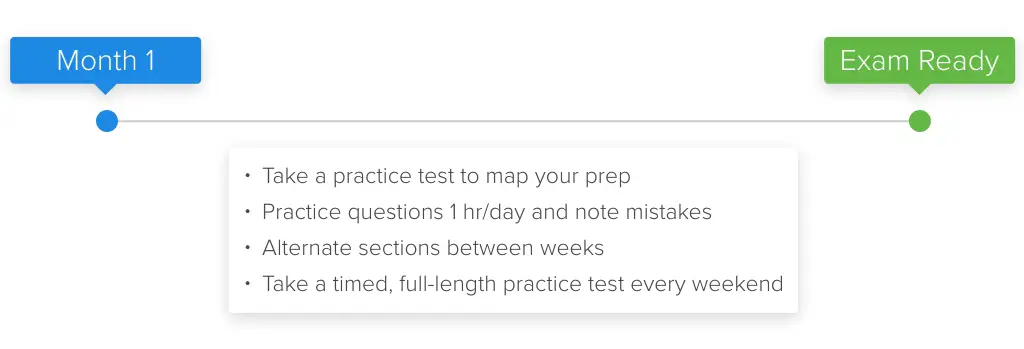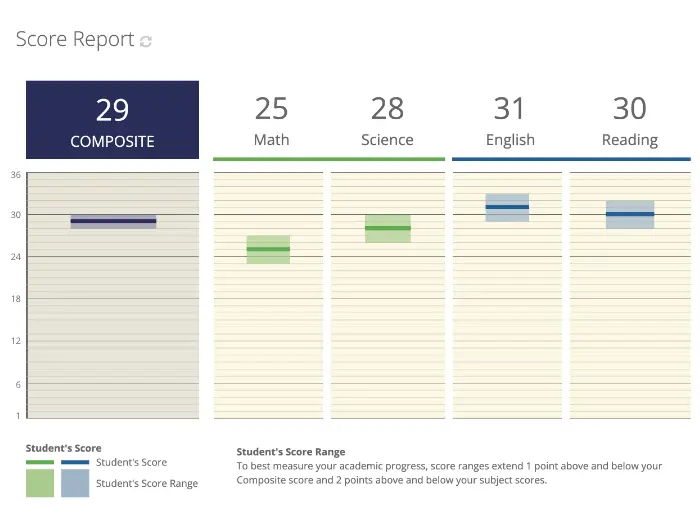The ACT® is one of those exams that can make or break your college and scholarship applications. Given its significance, a lot of students retake the test to improve their scores and boost their chances of getting into their dream college. While it’s best to prepare for a few months before retaking the test, you can still improve your ACT score by up to 3 points in as little as a month.
With one month to go, it is important to set a realistic score goal. This will bring things into perspective and help you focus on the areas where you can actually improve. These might include improving your test-taking skills and focusing on the subject areas where there’s an opportunity to get better.
Here are 5 tips on how to improve your ACT score by 3 points in just a month.
1. Set a Goal for a Realistic Score
-
A score report from a previous test or the results of a practice exam can help you determine a baseline score
Use that number to set a new target score that is reasonably attainable. Having a clear scoring goal will motivate and streamline your study efforts. -
Consider not only your composite score, but also the individual scores for each section
Your ACT score report shows section scores in Math, Science, English, Reading, and Writing. Set realistic targets for each section based on your scores. Aim for a feasible point increase, as jumping from a score of, say, 24 to 36 in one month is highly unlikely. Instead, increasing it by just 2-3 points is certainly within reach. -
Look at admission guidelines and score ranges for the schools you want to attend
If the colleges you’re interested in do not require an ACT essay score, you don’t have to worry about taking that portion of the test. Although most colleges won’t provide a specific number when asked what score you need to get in, they do publish average scores for incoming freshmen. This can give you an idea of a specific score to shoot for. Here’s a list of scores usually accepted at the top 25 schools and Ivy Leagues.
2. Identify Growth Opportunities from Your Score Report
-
Understand your current ACT score or benchmark score from a practice performance assessment
Use section and cross-test (ELA and STEM) scores to identify subjects you need to work on. Remember to note the ACT college readiness benchmarks for each of these sections. These can determine if you need a score improvement plan for a particular subject or for several. -
Evaluate which types of questions and content types you get right and wrong
Once you identify the subject areas that need a score boost, check out the “Detailed Results” section of the score report. This explains how you scored on specific skills and topics for each subject area. Note the percentage of correct answers for each to narrow down any topics and skills that hold the strongest potential for improvement.
3. Gather Resources
-
Locate effective study resources
Since the ACT covers what you’ve been learning in high school, course materials that correspond to what’s on the test are an excellent resource. Ideally, a mix of online and offline resources will improve your test preparation. You can also find online test-prep resources such as the following free practice questions and full-length tests: -
Choose resources tailored to your learning style
Some students prefer to learn from audio-visual tutorials and study materials, whereas others prefer regularly timed practice tests. And some still tend to learn better with a mix of both types of resources. Identify your learning preference and include a majority of study materials that align with it. Doing so will help you retain more of what you learn within a month.
You can also ask your teachers or guidance counselor for additional suggestions on how best to prepare.
4. Create an Effective Study Schedule
-
Create a study plan and stick to it
Commit a certain number of hours per week to studying and taking ACT practice tests. Be practical and considerate of your overall schedule; focus on what you can comfortably incorporate into your study plan. Share your plan with family and friends so they can support you and minimize distractions. -
Focus on “high yield concepts”
With just one month remaining, there’s still time to grasp a few new concepts and make the most of it! Focus on concepts and target subject areas you can master quickly. This is also a good time to work on eliminating habits that result in unintentional mistakes, a stronger approach to analyzing prompts, and strategies for efficient time management and organization. -
Remember to maintain a healthy study-life balance
Preparing for a significant test like the ACT in just one month is an exciting challenge full of opportunities for growth. Prioritizing self-care is crucial during this time – a healthy mind and body will undoubtedly contribute to your peak performance on the test day.
Make sure to take breaks for movement, hydration and sleep between your study sessions. Reward yourself for sticking to your study routine with fun activities to help calm your nerves. Taking care of yourself is just as important as studying, so don’t forget to do both!
5. Take Practice Tests to Improve Quickly
Regular practice is key to score improvement. In addition to completing an actual ACT, full-length diagnostic tests provide an authentic sense of the exam’s timing and content. According to ACT.org, short-term prep like workbooks or timed-practice tests can boost scores by 1.5 points1, while long-term prep can raise scores by up to 5.8 points.

Here’s how you can benefit from consistent practice:
-
Take practice tests simulating the actual testing environment
Concentrate on the high yield growth areas you identified and practice under realistic testing conditions. Stick to the time limits for each section and when faced with unfamiliar questions, trust your intuition and make an educated guess, mirroring the approach you would take in a school or testing center setting. -
Dedicate time every day to ACT practice questions
Set aside one hour every day for practice questions. Any question that requires a guess or stumps you is a growth opportunity. Note these instances and keep track of any mistakes. That way, you can rework these sections and practice relevant skills until you’re fully confident. Work on any problem areas and take a full-length, timed practice test every weekend. Evaluate your performance to understand whether you’ve improved upon–or even mastered–your weaknesses. -
Track your performance and understand your growth opportunities
Whether you are retaking the ACT to boost your score or preparing to take the ACT for the first time, it’s important to evaluate areas that require a deeper understanding and skill development. Craft an effective study plan focusing on targeted improvement in these key areas. UWorld’s ACT Prep Course can help, too—it tracks your performance, gives valuable insights into your score, and helps refine your study plan so you can allocate your time wisely toward your target areas. -
Review and clarify fundamental concepts with answer explanations
As you engage in practice tests, you’ll have the opportunity to analyze gaps where you can grow. Utilize our answer explanations for any questions you may get wrong or need to make an educated guess, allowing for valuable learning experiences. They’ll help you understand why the right answer is right and why the other choices are wrong. Note any important points on flashcards and keep them handy for easy reference.
Lastly, it is important to stay motivated and focused on your goal throughout the test preparation process.
Tying It All Together
To improve your score by 2-3 points within a month, a strategic approach to ACT exam preparation is vital. It maximizes study efficiency, pinpointing high-yield areas for improvement and fostering confidence, thereby ensuring a well-rounded preparedness to confront the test’s challenges. Whether you’re retaking the ACT to raise your score or taking the test for the first time, UWorld’s ACT Prep Course provides in-depth test-prep tools to help you achieve your target score. Get ready to succeed as you dive into this focused and effective preparation journey!
As you gear up for another shot at the ACT, also be sure to take breaks to unwind. Your previous experience with the exam gives you an edge—you’re already familiar with its format and content. Plus, you’ll probably find it easier to navigate the time constraints in each test section. Knowing the ins and outs of the ACT will set you up for success on your next attempt. Good luck!

References
- Sanchez, Moore, & San Pedro. (2018). Investigating Test Prep Impact On Score Gains Using quasi-Experimental Propensity Score Matching. https://www.act.org. Retrieved October 19, 2023, from https://www.act.org/content/dam/act/unsecured/documents/R1710-investigating-test-prep-impact-2018-07.pdf




